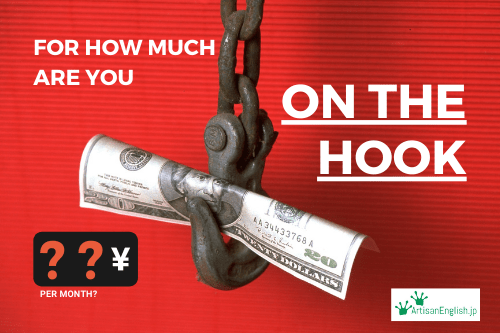
YouTube / iTunes / Spotify / Radio Public / Pocket Casts / Google Podcasts / Breaker / Overcast
Listen to ArtisanEnglish.jp posts & lesson intros here.
Idiom: On the hook (for something)
Estimated reading time: 2 minutes
I recently created a new discussion topic about the Subscription Economy, which has left many people finding themselves on the hook for monthly or yearly payments long after they have forgotten about them.
When you are on the hook for something, you either owe money or are responsible for something.
This year many people are discovering they are on the hook for online streaming service subscriptions.
They thought those services were a godsend last year during lockdown but now are neglecting them.
Sometimes, it’s easy to subscribe to a service but very challenging to cancel it.
You may be able to subscribe online but have to make a phone call to cancel.
Then, it’s not simply one person you have to talk to, but multiple and each one will try to dissuade you from cancelling by offering discounts or increasing benefits.
Once you are on the hook for something, it’s tough to get off it.
Like or follow ArtisanEnglish.jp on social media.
Even the people who donated to Donald Trump’s 2020 presidential campaign have found themselves on the hook for recurring donations instead of the one-time donation they intended.
Yep, good ol’ Trumpy scammed them. Imagine that.
His campaign made all donations automatically recurring because they were running out of cash.
A donor had to uncheck a box to opt out of this automatic donation.
Last year, many Republicans found themselves on the hook for multiple contributions they never intended.
Then Trump wound up on the hook for $122,000,000 (a hundred and twenty-two million) in refunds.
There you have it.
Be careful what you subscribe to, and always know for how much you are on the hook.
Flesch-Kincaid Readability Test
This post is understandable by someone with at least an 8th-grade education (age 13 – 14).
On the Flesch-Kincaid reading-ease test, this post scores 64.
The easier a passage is to read, the higher the score on a scale of 0 – 100.

